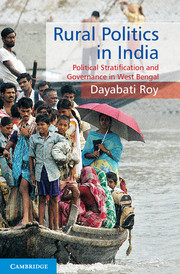Book contents
- Frontmatter
- Contents
- List of Tables
- List of Abbreviations
- Acknowledgements
- 1 Introduction
- 2 Land, Development and Politics in West Bengal
- 3 Changing Landscape of Two Villages in West Bengal
- 4 Seeing the State and Governance in the Grassroots
- 5 Party and Politics at the Margin
- 6 A Narrative of Peasant Resistance: Land, Party and the State
- 7 Caste and Power in Rural context
- 8 Women and Caste: In Struggle and in Governance
- 9 Conclusion: A New Kind of Peasant Mobilization?
- Glossary
- References
- Index
9 - Conclusion: A New Kind of Peasant Mobilization?
Published online by Cambridge University Press: 05 January 2014
- Frontmatter
- Contents
- List of Tables
- List of Abbreviations
- Acknowledgements
- 1 Introduction
- 2 Land, Development and Politics in West Bengal
- 3 Changing Landscape of Two Villages in West Bengal
- 4 Seeing the State and Governance in the Grassroots
- 5 Party and Politics at the Margin
- 6 A Narrative of Peasant Resistance: Land, Party and the State
- 7 Caste and Power in Rural context
- 8 Women and Caste: In Struggle and in Governance
- 9 Conclusion: A New Kind of Peasant Mobilization?
- Glossary
- References
- Index
Summary
The ethnographic findings described in the foregoing chapters reveal that the changes in rural societies of India have been enormous and ‘things are not what they used to be’. Today, the vast masses of the rural people in India are no longer the same as ‘the state has become implicated in the minute texture of everyday life’. During the last couple of decades, the rural people, particularly in West Bengal, have undergone a lot of transformations in all spheres – economic, cultural and political – of life. In the economic sphere, the majority of the households in both the villages are still dependent on agriculture either as cultivator or agricultural labourer, though they do show some evidence of growth of income with non-farm works. As agriculture is believed to have stagnated and become unprofitable due to the increase in cost of all inputs, trade liberalization and dwindling public investments in rural development as part of neo-liberal reforms (Patnaik, 2003), peasant masses are turning towards non-farm sectors. Here, too, they do not find enough opportunities to procure work since the work has either become scarce or is insecure and risky in the rural localities. This finding seems to be in part different from a recent research which reveals that rural India has been undergoing ‘a slow and arduous transformation from an agriculture-based economy to one that is based on industries and services, and with agriculture serving an important but secondary role’ (Lindberg, 2012: 73).
- Type
- Chapter
- Information
- Rural Politics in IndiaPolitical Stratification and Governance in West Bengal, pp. 235 - 254Publisher: Cambridge University PressPrint publication year: 2013



